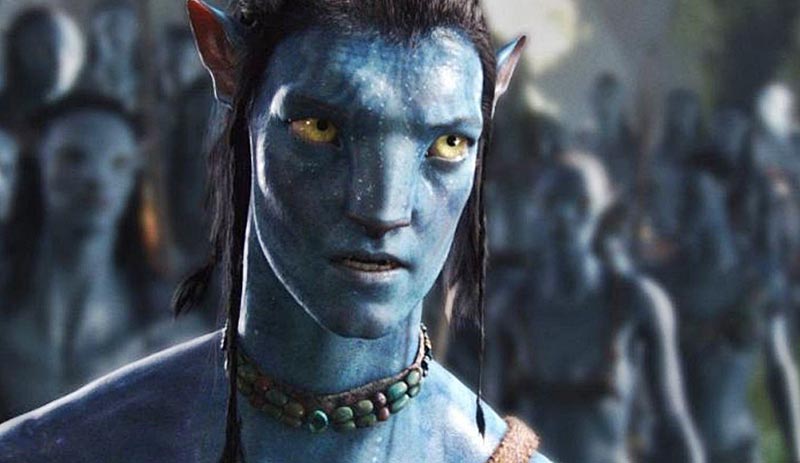In my continuing quest for negative reviews of 2010 Best Picture Academy Award nominees, I turn now to the science fiction nominees. First up is James Cameron’s Avatar, the Rupert Murdoch financed 3D sci-fi extravaganza that has grossed more than $2.46 bn as of this writing. In addition to its 9 Academy Award nominations, it should also receive a prize as the most heavily dissed film at this year’s award ceremony. There are exceptions, of course. Roger Ebert gushes. The New York Times calls it “Glorious and goofy and blissfully deranged.”

But then there’s Robert Fulford’s review in MacLean’s. We read phrases like “narrative dead end” and “simple-minded story.” A “sub-prime performance” and the worst performance of Sigourney Weaver’s career. His primary criticism is that the film is riddled with clichés. Even the extraordinary special effects become clichés because they get recycled throughout the film. Salon’s Stephanie Zacherek goes one further by accusing Cameron of having no sense of humour. Cameron aspires to lofty themes like U.S. militarization and colonization of both indigenous people and the natural world. While Star Wars also presented an allegory with lofty themes, it at least provided the audience with comic relief via the chatterbox droid and the hairy pilot. Cameron’s film offers no such relief.
The question isn’t whether Avatar is a good film. It is. It’s entertaining. The special effects are stunning. The immersive 3D environment is engaging. But is it Best Picture material?\
Here’s one way of looking at this question. No science fiction feature film has ever won a Best Picture Academy Award. How does Avatar stack up against some of its predecessors which have not received awards? How does it compare to 2001: A Space Odyssey, Star Wars, even The Matrix. The answer is: it doesn’t. With “Open the pod bay door, Hal” and “May the Force be with you” and “Why oh why didn’t I take the BLUE pill?” we have films whose scripts and images have become cultural touchstones. They have transcended their times and found a fresh audience in the succeeding generation. And, as perhaps the greatest sign of cultural durability, they continue to support successful parody. Despite its market penetration, Avatar will never succeed by any of these measures.
The other sci-fi film nominated in the Best Picture category is Neill Blomkamp’s District 9, an allegory of race from South Africa. One is immediately struck by the similarities between Avatar and District 9. Both involve military powers exploiting alien populations. Both feature protagonists who undergo some form of genetic mutation which allows them to straddle the oppressed and oppressing cultures. And both present an anti-colonial messages with absolute (and humourless) sincerity.

As with Avatar, District 9‘s biggest diss comes from a Canadian film critic, in this case, from Rick Groen of the Globe and Mail. What is it about this kind of film that gets Canadians so twisted into knots? Could it be that our proximity to the largest colonizing power in the world (and the fact that we are repentant colonizers ourselves) makes us more sensitive than others to these themes? Maybe we identify more readily with the straddling position of the protagonists and so crave a more nuanced presentation than the disaffected paraplegic ex-soldier of Avatar and the bumbling bureaucrat of District 9).
Like Fulford’s complaint about Cameron, Groen accuses Blomkamp of taking a perfectly serviceable premise and pissing it away on clichés. After the bureaucrat accidentally sprays himself with alien goo, “what began as a nifty premise morphs into a cluttered scenario chockablock with the usual riff-raff. Oh, there’s a ruthless mercenary and a savage warlord and the inevitable cold-hearted corporation, this time intent on unlocking the DNA secret to the aliens’ bio-weaponry and, you know, ruling the world.” Like Avatar, this film descends into a protracted military confrontation that blows everything up, including the film’s potential to deliver a nuanced presentation. Applying the criteria I used above (comparison to iconic sci-fi flicks), District 9 doesn’t come close to Oscar-worthy. It is shocky-schlocky special effects driven entertainment.
A more interesting and, perhaps, pressing question is whether the issues of our day – militarization, colonialism, xenophobia, environment – are well served by big media entertainment vehicles. There is a danger that if blockbuster films financed by big media and lauded by a narcissistic entertainment industry can reduce even our most serious concerns to a string of hackneyed clichés, then we will be drawn a little further along a path of cynical despair. Following the methods of corporate greenwashing, serious issues are merely opportunities. They are objects to be colonized and exploited for profit. And in the case of both these movies, the profits are enormous. (Although District 9 doesn’t even approach Avatar, it still has grossed more than US $200 million.) By assuming such a dominant position within our popular culture, these films serve as a point of reference for framing debate. But a “simple-minded” point of reference produces simple-minded debate.
I’m mindful of another term, first coined by Jean and John Comaroff twenty years ago (ironically in relation to apartheid in South Africa): colonization of consciousness. When power controls the terms in which public discourse is possible, then those who are subject to power lose the capacity to imagine themselves outside the structures which legitimize that power because the only language they have to think with is the language of their oppressors. And so, when power is structured on the basis of a free market economy, and its most popular critical voices are funded by big media, and its success is measured by the box office gross and by market penetration, are these voices not simply affirming what they claim to criticize? One begins to wonder if perhaps the greatest violence in these films is the violence committed against the minds of those who watch them.
